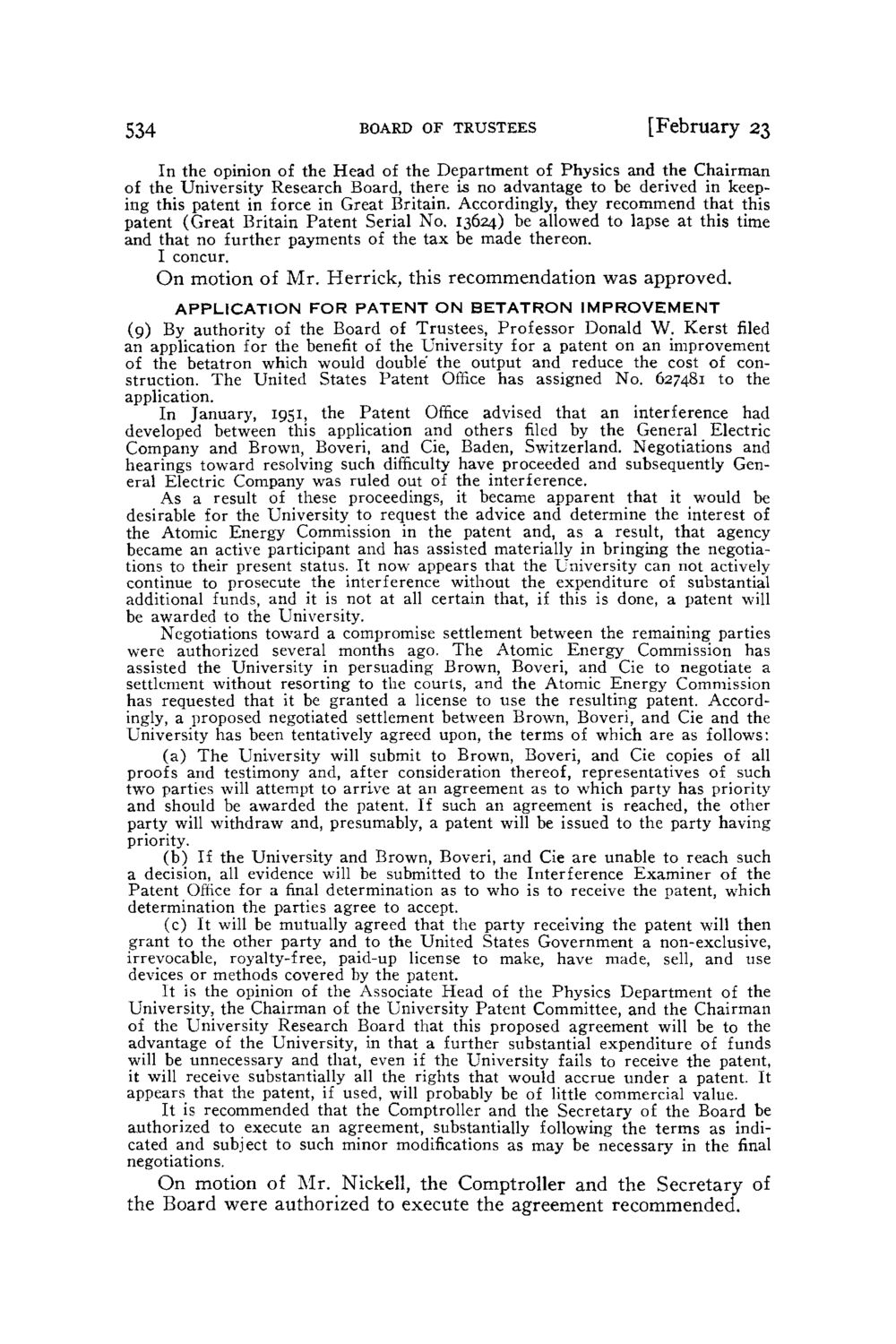| |
| |
Caption: Board of Trustees Minutes - 1954
This is a reduced-resolution page image for fast online browsing.

EXTRACTED TEXT FROM PAGE:
534 BOARD OF TRUSTEES [February 23 In the opinion of the Head of the Department of Physics and the Chairman of the University Research Board, there is no advantage to be derived in keeping this patent in force in Great Britain. Accordingly, they recommend that this patent (Great Britain Patent Serial No. 13624) be allowed to lapse at this time and that no further payments of the tax be made thereon. I concur. On motion of Mr. Herrick, this recommendation was approved. APPLICATION FOR PATENT ON BETATRON IMPROVEMENT (9) By authority of the Board of Trustees, Professor Donald W . Kerst filed an application for the benefit of the University for a patent on an improvement of the betatron which would double' the output and reduce the cost of construction. The United States Patent Office has assigned No. 627481 to the application. In January, 1951, the Patent Office advised that an interference had developed between this application and others filed by the General Electric Company and Brown, Boveri, and Cie, Baden, Switzerland. Negotiations and hearings toward resolving such difficulty have proceeded and subsequently General Electric Company was ruled out of the interference. As a result of these proceedings, it became apparent that it would be desirable for the University to request the advice and determine the interest of the Atomic Energy Commission in the patent and, as a result, that agency became an active participant and has assisted materially in bringing the negotiations to their present status. It now appears that the University can not actively continue to prosecute the interference without the expenditure of substantial additional funds, and it is not at all certain that, if this is done, a patent will be awarded to the University. Negotiations toward a compromise settlement between the remaining parties were authorized several months ago. The Atomic Energy Commission has assisted the University in persuading Brown, Boveri, and Cie to negotiate a settlement without resorting to the courts, and the Atomic Energy Commission has requested that it be granted a license to use the resulting patent. Accordingly, a proposed negotiated settlement between Brown, Boveri, and Cie and the University has been tentatively agreed upon, the terms of which are as follows: (a) T h e University will submit to Brown, Boveri, and Cie copies of all proofs and testimony and, after consideration thereof, representatives of such two parties will attempt to arrive at an agreement as to which party has priority and should be awarded the patent. If such an agreement is reached, the other party will withdraw and, presumably, a patent will be issued to the party having priority. (b) If the University and Brown, Boveri, and Cie are unable to reach such a decision, all evidence will be submitted to the Interference Examiner of the Patent Office for a final determination as to who is to receive the patent, which determination the parties agree to accept. (c) It will be mutually agreed that the party receiving the patent will then grant to the other party and to the United States Government a non-exclusive, irrevocable, royalty-free, paid-up license to make, have made, sell, and use devices or methods covered by the patent. It is the opinion of the Associate Head of the Physics Department of the University, the Chairman of the University Patent Committee, and the Chairman of the University Research Board that this proposed agreement will be to the advantage of the University, in that a further substantial expenditure of funds will be unnecessary and that, even if the University fails to receive the patent, it will receive substantially all the rights that would accrue under a patent. It appears that the patent, if used, will probably be of little commercial value. It is recommended that the Comptroller and the Secretary of the Board be authorized to execute an agreement, substantially following the terms as indicated and subject to such minor modifications as may be necessary in the final negotiations. On motion of Mr. Nickell, the Comptroller and the Secretary of the Board were authorized to execute the agreement recommended.
| |